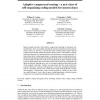Free Online Productivity Tools
i2Speak
i2Symbol
i2OCR
iTex2Img
iWeb2Print
iWeb2Shot
i2Type
iPdf2Split
iPdf2Merge
i2Bopomofo
i2Arabic
i2Style
i2Image
i2PDF
iLatex2Rtf
Sci2ools
ICASSP
2010
IEEE
2010
IEEE
Adaptive compressed sensing - A new class of self-organizing coding models for neuroscience
Sparse coding networks, which utilize unsupervised learning to maximize coding efficiency, have successfully reproduced response properties found in primary visual cortex [1]. However, conventional sparse coding models require that the coding circuit can fully sample the sensory data in a one-to-one fashion, a requirement not supported by experimental data from the thalamo-cortical projection. To relieve these strict wiring requirements, we propose a sparse coding network constructed by introducing synaptic learning in the framework of compressed sensing. We demonstrate that the new model evolves biologically realistic spatially smooth receptive fields despite the fact that the feedforward connectivity subsamples the input and thus the learning has to rely on an impoverished and distorted account of the original visual data. Further, we demonstrate that the model could form a general scheme of cortical communication: it can form meaningful representations in a secondary sensory area...
| Added | 06 Dec 2010 |
| Updated | 06 Dec 2010 |
| Type | Conference |
| Year | 2010 |
| Where | ICASSP |
| Authors | William K. Coulter, Cristopher J. Hillar, Guy Isley, Friedrich T. Sommer |
Comments (0)

